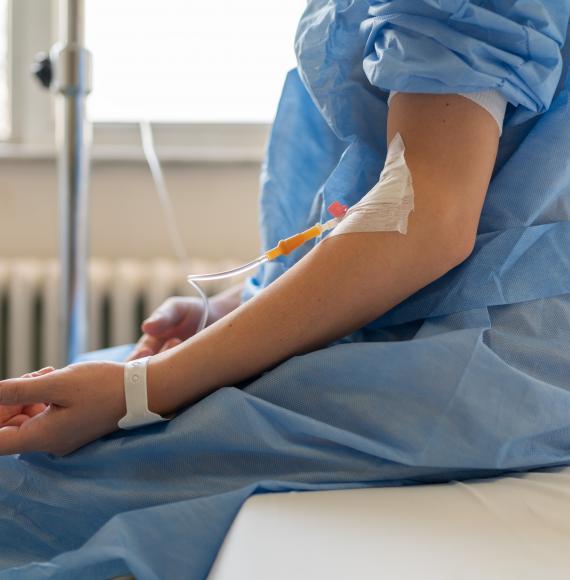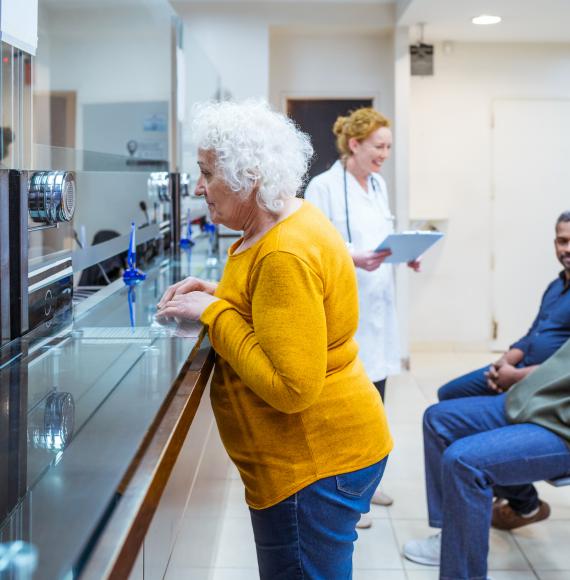Changing access to NHS diagnostics could have a big impact on equity, waiting times, workforce effectiveness, and on NHS recovery post-Covid.
Imagine for a moment that patients had the ability to book a test or a scan on any high street of their choosing. All they would need to do is complete an online questionnaire, that may well access their electronic health record. This would determine the need for the test, or not, and the patient could then book an appointment online at a time and location of their choosing.
It might sound radical. But it’s the sort of thinking that represents the fundamental change needed in how we control access to diagnostics, if we are to make transformational changes in outcomes, for example diagnosing cancer at much earlier stages.
It will be hugely disruptive to the way many of our staff work. But I truly believe that the 2020s could be the decade in which we radically transform the patient experience, diagnose at much earlier stages of disease progression, treat at a lower cost as a result, and deliver much better outcomes for the patient. This decade should see unit costs, for example costs per scan of diagnostics, radically fall so that we can put them at the frontline of care for patients. We can create the decade of the diagnostic.
For too long our clinicians been given the unenviable task of being a gatekeeper, rather than having information that enables them to be more confident about choosing the right pathway for their patient. Some of the most disadvantaged people in our society found it difficult, if not impossible, to access the right care, sometimes simply because they were not been able to afford the bus fare to hospital.
The key is to utilise technology advances and AI to reduce the unit cost of tests and reporting of results. For example, scanning machines are becoming smaller, less complicated to operate, lower cost, and are being coupled to AI algorithms that support decision making, in ways we hadn’t imagined a few years ago.
We are at an inflexion point in the NHS. So, are we up for turning high volume pathways on their heads, truly putting the patient first? Are we willing to question how what was thought of as critical estate such as outpatients, will be used? Are we ready to control costs by getting it right the first time, rather than forcing people to queue and be seen at a rate that only the budget allows?
Decade of the diagnostic: Changing control
With a mass community testing programme underway to address the ongoing pandemic, there has been a change in public mindset about the role citizens can play in diagnostics, with millions of people taking part.
The conditions are right to push the boundaries away from a parental approach to health services, to trusting the public much more.
I’m a ‘trekkie’ and have long been fascinated by the tricorder, a medical scanning device used on the science fiction series Star Trek. Putting the futuristic technology aspect to one side, some of the principles behind that imaginary mobile scanning tool, could inform our model in the present day – getting diagnostics out to people.
There are already apps for carrying out a huge range of activities on your smartphone – including the ability to carry out electrocardiograms, for example. And imaging modalities – traditionally found in the hospital – are also starting to gain mobility. If we can build on this, then ease of access and the unit cost of diagnostics could move to such a level that we can use community approaches as a first line of care in the NHS.
We need to go boldly now
The beginnings are already in motion. Greater Manchester is currently rapidly deploying new diagnostic imaging technology across the whole region, in an initiative designed to support better and earlier diagnoses for millions of people. And this initiative could support the type of distributed models now needed.
That’s why our region’s approach to diagnostic imaging sits on my desk as a CEO. I see it as a significant lever to how population health could improve, and fundamental to the questions around access and equity: questions the team in Greater Manchester have considered as they have explored diagnostic technology decisions. You can do all the fancy stuff you want with tech – but if capacity, patient’s busy lives, health literacy, deprivation and any number of reasons prevent people coming to hospital, how do you help them?
Right now, we are working to address that with the help of our new diagnostic technologies that give us an advantage. Rather than expecting patients to always come to hospital, we are taking services to patients through the future development, of community diagnostic hubs – a national initiative Greater Manchester is helping lead.
The answer to identifying more cancers early will not come from a fancy new building. But it might come from shop fronts that form part of a hub to improve access where there is deprivation and inequity in access.
The CEO agenda
Every NHS chief executive already understands the fundamental importance of diagnostics in their hospital. They now have an opportunity to look at diagnostics as more than a constraint and to appreciate the art of the possible. This is not just about AI and all whizzy things. And it is sometimes about more than the future vision. It is also about the basics of how well a multi-disciplinary team could work, how we can enhance productivity, and how we can address and even out waiting times.
I’ve spent time with radiologists in some of the first sites already benefiting from our regional imaging programme. The ease with which an MDT meeting can now happen is phenomenal. Rather than taking days or weeks to arrange, I’ve seen three super specialists work together on a scan in seconds. And I’ve been told by staff, that it is leading to better clinical decisions.
It is having a big impact on productivity in a way not typically seen in the NHS. As a result of our leading-edge technology, our teams are reporting on hundreds more patients with little or no additional staff.
The pandemic needs us to optimise resources so that we can care for as many patients as we can. With remote working, we are addressing major recruitment challenges the NHS faces in areas like radiology.
The North West has the highest number of retiring radiologists in the country. But our people no longer need to necessarily be in Greater Manchester, because our new technologies have already allowed us to remove workforce constraints posed by the four walls of a hospital, and we have identified radiologists from across the world who have the right credentials to come and work with us.
Across the country, millions of patients are waiting to be seen, as the NHS attempts to manage a very significant backlog. The key is diagnostics.
We are starting to win the argument about having a larger share of the recovery fund coming into diagnostics. The more CEOs that call for that, the more likely it will be to happen.



















